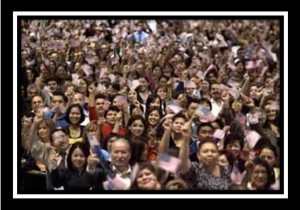_name.png)
We love initialisms – just take a peek at how people type their messages on the phone nowadays. Our country, the United States of America is usually spelled and pronounced “USA.” Another big country across the Pacific Ocean, the People’s Republic of China is shortened to “PRC.” We call the National Football League the “NFL.” When we say IQ, most people know it means the longer “intelligence quotient.” The list goes on and on. (Some people may call these contractions acronyms. I’ll get back to it later.)
Here’s an old initialism that may vex your high IQ a bit: “ABC” for American-born Chinese.
The term “American-born Chinese,” or “ABC,” although popular among Americans of Chinese descent, may give a meticulous schoolmarm some trouble parsing it grammatically. Here, the word “Chinese” is the noun, and the phrase “American-born” modifies the noun like an adjective. Hence, if they are ABCs, these folks are Chinese, not  Americans, which is incorrect. So I propose calling them CPAs, short for Chinese-Pedigreed Americans. Huh….
Americans, which is incorrect. So I propose calling them CPAs, short for Chinese-Pedigreed Americans. Huh….
I am looking at the issue above with linguistic syntax and legal clearness in mind. Many of you who are parents of CPAs may not agree, especially if you were born in Chinese-speaking countries or political territories, such as China, Taiwan, and Hong Kong. You may insist that your US-born children are Chinese because their DNA is Chinese. Therefore they are ABCs, with emphasis on the “C.”
I was born and raised in Hong Kong when it was a British colony. I was legally considered a British “subject.” I never knew what the queen meant by that. But according to the Merriam-Webster Dictionary, it is “a person or thing that is being dealt with in a particular way….” Hmm…. If a British subject wanted to travel beyond the Hong Kong borders, he or she would have to apply for a Hong Kong passport. The holder of that passport would be eligible to further apply for visas to go to many countries, including the United Kingdom. Yes, as a British subject, you would still need permission to travel to Britain. The same general restrictions on foreigners applied to you.
Since Hong Kong was not a country, I really was born without one. Technically, China was (and some say, it still is) in a civil war between the Communists and Nationalists. That’s how my family ended up in Hong Kong, as refugees from the mainland. My parents, although without the financial means to move to a foreign country to flee the war, would ingrain into their children to leave before fighting resumed again. That indoctrination worked quite well with the wanderlust in me. So I left when I was 19 and that was 40 some years ago! I am telling you this, and giving away my age, because my ties and claims to being Chinese are ethnic and cultural, as opposed to legal. That background made it easy for me to adopt a new nationality because I never had one.
Gary Locke, a third-generation Yankee and former ambassador to PRC, said it quite well: “I’m proud of my Chinese heritage. I’m proud of the great contributions that China has made to world civilization over thousands of years. But I’m thoroughly American. I’m proud of the great values that America has brought to the entire world and all that America stands for.”
I know the initialism ABC has been around for years and decades, and most people know what it means. The fact that it sounds cutesy doesn’t hurt. So it will be hard to change to something like CPA. There’s an additional problem with the abbreviation CPA. Most people would think it stands for “certified public accountant.” In that case, an argument can be made that, in order to avoid that confusion, we should clunkily say something like “my child is an American but his or her parents came from Country XYZ.” It’s your child’s identity. How you want to describe it is your choice. (And when the child grows up to be an adult, his or hers.) Just keep in mind that a perfectly objective listener may think that an ABC is a Chinese national who was born in the US. After all this mumble jumble, you and I may ask ourselves: What’s wrong with plain “American?” I personally like it the best. I think the beauty consists in the accurate simplicity.
I promised you in the beginning that I would get back to the word “acronym.” According to my favorite reference, the Merriam-Webster Dictionary, “initialism is an abbreviation formed from initial letters.” Examples would be NCAA (National Collegiate Athletic Association) and FBI (Federal Bureau of Investigation). An acronym, on the other hand, is “a word formed from the first letters of each one of the words in a phrase.” (Underscore added.) Examples would be NATO (North Atlantic Treaty Organization) pronounced as NA-to, and POTUS (President of the United States) pronounced as PO-tus.
Finally, I wanted to tell you that I wasn’t that smart to know the subtle difference between an initialism and an acronym. I always thought they were interchangeable nouns, until I looked up MW to make sure. Now you know. Pass it on to your CPA. TKVM.
*** The End ***
(The dissemination of this writing is for non-commercial enjoyment only. The author reserves the copyright for himself)
.
Note: Click here to continue browsing other writings and works of Camillus Chan within this site